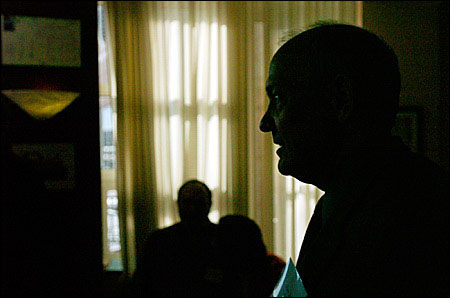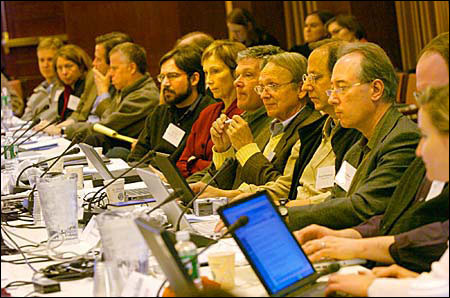Who’s got the power?
Bloggers vie with journalists in the era of the Internet

“Blogging versus journalism is over,” announced media critic and blogger Jay Rosen in the title of his introductory speech at the Jan. 21-22 conference on “Blogging, Journalism and Credibility: Battleground and Common Ground.” It was a bold premise, but, as the conference confirmed, a bit premature.
“I certainly think there are some tensions,” said The New York Times’ managing editor Jill Abramson, of the relations between bloggers, the revolutionary “citizen journalists” of the Internet, and professional journalists. She would know. At a time when the mainstream media are under siege, the independent, often unruly voices of the blogosphere are gaining ground.
Co-sponsored by Harvard Law School’s Berkman Center for Internet and Society, the Shorenstein Center at the Kennedy School of Government, and the American Library Association, the conference took place at an opportune time. Attended by media professionals, academics, Internet entrepreneurs, and webloggers, it served as an apt venue for the media, both old and new, to duke it out.

“You’re not the boss anymore, what you say is not the law,” continued Rosen, who is chairman of the journalism department at New York University. “We have,” he said, throwing down the gauntlet, “conditions that represent a crisis in mainstream journalism.” Assaulted by a string of disasters – with “Rathergate” as the most recent example – the conventional press is on the defensive, and, according to its critics, in need of radical retooling.
“I think that accountability and transparency are the greatest contributions bloggers can make to mainstream journalism,” said Alex Jones, the director of the Shorenstein Center, who moderated several of the discussions at the conference. “I think mainstream journalists should be accountable for how they came to the decisions they did, and why they made them.”
Not that Abramson would disagree. “There have been many troubling episodes in the mainstream media where there have been credibility problems,” she explained in an interview during a break in the conference. “Certainly I lived through a very painful period at the Times when we had the Jayson Blair problem.”
Meanwhile, the blogosphere has grown exponentially. According to the Pew Internet and American Life Project, blog readership jumped 58 percent last year, and 27 percent of adult Internet users now turn to blogs, facts that the mainstream media – that’s MSM in bloggerspeak – have been somewhat sluggish to absorb.
Though largely opinion-based, blogs have also made news and broken stories, largely by venturing where the MSM fear to tread. Powerline, a conservative blog, was one of the first to raise questions about the authenticity of memos on President Bush’s National Guard service, broadcast by CBS on “60 Minutes.” Bloggers also recently received rave reviews for their coverage of the devastating tsunami in Asia.
With this track record, it’s not surprising that bloggers are demanding a bit more deference. “I think there’s a widespread feeling among some bloggers that over the last couple of years, we’ve grown increasingly important, increasingly relevant as part of the media cycle, and that we don’t necessarily get a lot of respect – particularly from journalists,” explained Ethan Zuckerman, a blogger and Berkman Center fellow.
But while bloggers might want recognition from the MSM, they generally don’t want to become like them, beholden to standards of objectivity and impartiality, which might clip their wings. Bloggers are known not for their fact-checking, nor even their spell-checking abilities, but for their “voice,” which they tout as authentic, immediate, and far more powerful than anything the MSM have to offer.
“We’re idealists,” said weblog pioneer Dave Winer, who runs the blog “Scripting News.” “If you want to cut to the core, we’re like ‘Mr. Smith Goes to Washington.’ We have a passion for news.” What bloggers do with that passion, however, is a matter of debate.
“Journalists report things, bloggers do things,” wrote Hossein Derakhshan, a blogger from Iran who joined the conference via an IRC (Internet Relay Chat) channel. “Blogs are bringing back the early hope of journalism, to change things.” In the process, they are returning journalism to its roots, the scrappy pamphleteering days when any and every opinion could be had, on the cheap.
As such, the blogosphere suffers from credibility problems of its own. How, for instance, might a newcomer know which sites are trustworthy, and which filled with inflammatory partisan vitriol? Ought anonymous bloggers hurling insults to be discouraged – or tolerated? Should bloggers disclose their financial interest in the subjects they cover, or abstain altogether? The unbounded chaos created by the presence of around 8 million idiosyncratic blogs – of which only about 100 get much traffic – is the subject of some controversy.
“There’s so much attack going on online, it’s hard to know what is noise and what is really credible,” said Judith Donath, an assistant professor at the M.I.T. Media Lab, in her presentation to the conference. David Sifry, the founder and CEO of Technorati, a popular search engine for the blogosphere, picked up her point: “The problem with anonymity is the lack of accountability, so anybody can say anything and just disrupt the conversation.”
Despite these concerns however, so far bloggers have resisted adopting a set of guidelines, or code of ethics, with which to police their kind, and there was little effort at the conference to establish one. “The Internet culture in general is sort of anti-establishment, anti-authority,” said Joe Trippi, of Trippi & Associates, formerly the national campaign manager for Howard Dean’s presidential bid. “It’s actually more a fear of being co-opted by the mainstream media, I think.”
Indeed, the MSM have tried to catch the wave of the blogosphere, but keep it “in house,” where it can be better controlled. “At MSNBC, we don’t have a show that doesn’t have a blog attached to it,” Rick Kaplan, the president of the cable network, told the conference. Similarly, Abramson explained that she looks to blogs as a breeding ground for new talent. “That’s probably the principal reason why I like to keep up with the coolest blogs,” she said.
But according to David Weinberger, an author, commentator and Berkman Center fellow, the MSM, in their attempts to appropriate the blogosphere, are perhaps missing the point. “The media people were still embracing weblogs on the media’s terms, and in a way that misses some of the value of weblogs and minimizes the potential threat to their way of doing business,” he explained in an interview at the end of the conference. “That’s how you incorporate weblogs without having to face the possibility that your business may be radically changing.”
But on a sunnier note, Weinberger, like many bloggers at the conference, concluded that most of the mainstream media in attendance seemed willing to play along. “There’s nobody here who – at least publicly – wrote bloggers off as pajama-based fiction writers. That was not exactly shocking, but it was surprising.”




